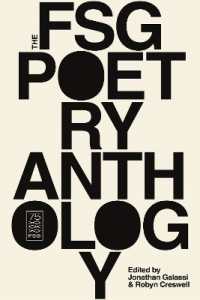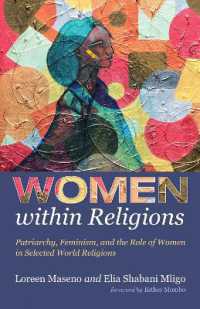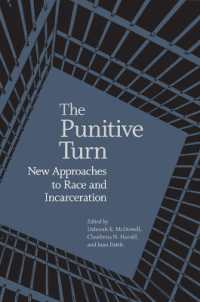- ホーム
- > 洋書
- > 英文書
- > Business / Economics
Full Description
The field of employment and industrial relations explores a myriad of complex topics, themes and phenomena, and this book provides a guide for researching this fascinating area. Investigating micro-, meso-, macro- and cross-national forms of analysis, it is a crucial toolkit for researchers to consult in their studies.
The Field Guide to Researching Employment and Industrial Relations is a vital examination of emerging and established methodological approaches, from qualitative research to transdisciplinary methods. Vignettes throughout the chapters showcase research methods in action, paired with experience-based reflections from expert researchers. The book is an accessible compendium of methodologies - perfect for any stage of the research process.
Early career researchers focusing on employment and industrial relations, human resources and labour economics will find this book to be an important resource. An indispensable repository of established and emerging research methods, it is also beneficial to experienced researchers and academics.
Contents
Contents
Introduction to Researching Employment and Industrial Relations 1
PART I THE EVOLUTION OF EMPLOYMENT/
INDUSTRIAL RELATIONS RESEARCH METHODS
1 The Evolution of Industrial Relations Research Methods:
A Review of Key Union Effects Studies from the late 20th
to early 21st Century 14
Kwon Hee Han, J. Ryan Lamare and Tingting Zhang
PART II THE CHANGING FORTUNES OF
QUALITATIVE METHODS IN
EMPLOYMENT/INDUSTRIAL RELATIONS RESEARCH
2 Archival Methods 30
Chris Forde
3 From guinea pigs to agents: the potential of participatory
action research in union revitalisation and worker
participation studies 45
Pedro Chaves and Sara Lafuente
PART III TOWARDS MULTI- AND MIXED METHODS
IN EMPLOYMENT/INDUSTRIAL RELATIONS
RESEARCH
4 Using multi- and mixed methods research designs 69
Mark N.M.K. Saunders and Fariba Darabi
5 Researching unpaid labour within paid employment:
a mixed method exploratory sequential approach 86
Hyojin Seo, Valeria Pulignano, Bart Meuleman and
Markieta Domecka
PART IV EMPLOYMENT/INDUSTRIAL RELATIONS
METHODS ENCOURAGING A FOCUS ON
CERTAIN THEMES AND TOPICS
6 Oral history interviewing in employment/industrial
relations research 105
Mihajla Gavin
7 Autoethnography as a research method 120
Clement Sefa-Nyarko, Jane Alver, Kristy Ward and
Primatia Romana Wulandari
PART V INFORMATION TECHNOLOGY AND
TRANSNATIONAL ADVANCEMENTS IN
EMPLOYMENT/INDUSTRIAL RELATIONS RESEARCH
8 Computational annotation and database developments for
European works Councils and law 139
Rūta Liepiņa, Marcus Meyer-Erdmann, Pedro Hernàndez
Serrano and Walter Simoncini
9 The advantages and disadvantages of important datasets in
the field of Comparative employment relations 159
Bernd Brandl
10 Researching trade union movements through the lens of
social movements and shades of activism: fault lines,
industrial guerrilla and spontaneous disruption from below 173
Stéphane Le Queux, Anne Ngoc Cox and Ivan Sainsaulieu
PART VI CO-DESIGN AND TRANSDISCIPLINARY IN
EMPLOYMENT/INDUSTRIAL RELATIONS RESEARCH
11 Feminist approaches to research co-design: evaluating
gender equality initiatives 190
Helen Taylor and Sue Williamson
12 Transdisciplinary research on equity in the workplace 208
Janet Sayers and Jane Parker








